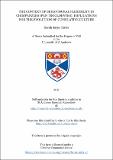The context of behavioural flexibility in chimpanzees (Pan troglodytes) : implications for the evolution of cumulative culture
View/
Date
20/06/2017Author
Supervisor
Funder
Keywords
Metadata
Show full item recordAltmetrics Handle Statistics
Abstract
Cumulative culture is rare, if not altogether absent in non-human species. At the foundation of
cumulative learning is the ability to flexibly modify, relinquish or build upon prior behaviours to
make them more productive or efficient. Within the primate literature, a failure to optimise
solutions in this way is often proposed to derive from low-fidelity copying of witnessed
behaviours, sub-optimal social learning heuristics, or a lack of relevant socio-cognitive
adaptations. However, humans can also be markedly inflexible in their behaviours, perseverating
with, or becoming fixated on outdated or inappropriate responses. Humans show differential
patterns of flexibility as a function of cognitive load, exhibiting difficulties with inhibiting suboptimal
behaviours when there are high demands on working memory. Here I present a series
of studies on captive chimpanzees which show that not only is inhibitory control compromised
in chimpanzees, but indicate ape behavioural conservatism may be underlain by similar
constraints as in humans; chimpanzees show relatively little conservatism when behavioural
optimisation involves the inhibition of a well-established but simple solution, or the addition of
a simple modification to a well-established but complex solution. In contrast, when behavioural
optimisation involves the inhibition of a well-established but complex solution, and especially
when the alternative solution is also complex, chimpanzees show evidence of behavioural
conservatism. I propose that conservatism is linked to behavioural complexity, potentially
mediated by cognitive resource availability, and may be an important factor in the evolution of
cumulative culture.
Type
Thesis, PhD Doctor of Philosophy
Rights
Attribution-NonCommercial-NoDerivatives 4.0 International
http://creativecommons.org/licenses/by-nc-nd/4.0/
Collections
Except where otherwise noted within the work, this item's licence for re-use is described as Attribution-NonCommercial-NoDerivatives 4.0 International
Items in the St Andrews Research Repository are protected by copyright, with all rights reserved, unless otherwise indicated.


